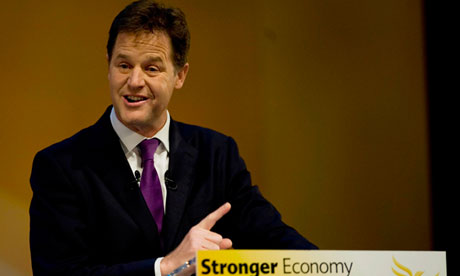
Nick Clegg's message could hardly be plainer. Like Oliver Twist, he wants some more. But Clegg wants more power, not another helping of soup.
He began his Glasgow conference speech by telling the Liberal Democrats: "We are a party of government now." And he ended it by saying: "Our place is in government again." His appetite is unmistakable.
If Clegg remains in government after the 2015 election, whether with Labour or the Conservatives, the Glasgow speech's unsparing focus on another five years in power will seem in retrospect to be a formidable act of leadership.
If that happens, Clegg will have turned the Lib Dems in less than a decade from a permanent protest party into an indispensable party of government.
On Wednesday, while quietly burying any notion that he stands for the realignment of the left and centre of which Roy Jenkins (and the Manchester Guardian of CP Scott) always dreamed, Clegg instead gave his party something more immediate to focus on – power.
Many will retort that he is living in dreamland. Wednesday's YouGov survey had his party on a mere 9% in the polls, down from 24% in the last general election.
Last week, just 4% of voters declared themselves certain to vote Lib Dem in 2015. In local government byelections last week, two Lib Dem candidates scored 31 and 32 votes respectively.
Party membership is lower than it has ever been – 42,000 and sliding, less than the population of Salisbury.
If Clegg was a football manager he would have been given the boot long ago.
A lesser leader might be tempted to pull up the duvet and scream. But Clegg seems to take the first world war general Ferdinand Foch as his model. During the battle of the Marne in 1914, Foch sent his superiors the dauntless message: "My centre is giving way, my right is retreating, situation excellent, I am attacking." And by attacking he won.
Clegg adopted Foch tactics in his speech on Wednesday. On every side, there is evidence of a wipeout. So Clegg gave his party the order to attack. Only they can stand up for both a stronger economy and a fairer society, he said. Labour would wreck the economy without our steadying hand. The Tories would fuel inequality without our decent values.
This 2013 party conference has always been marked down in his diary as potentially the most difficult of the current parliament – the one in which the excitement of government would have worn off, the economic austerity measures would be still biting, the election results continuing to tank, but without the enforced discipline of 2014's pre-election mood. This year, if any year, might be the year in which a challenge to Clegg's leadership might gain traction.
In the event, Clegg can rarely have had a better conference. He won all the key votes on the party's lightning rod issues – economic recovery, a 50p tax band, Trident replacement and nuclear power. Of his rivals, Chris Huhne is gone and Vince Cable has been marginalised, while the next generation waits on events.
In Glasgow, Clegg was master of all he surveyed. But how far is the field worth surveying? Is he Napoleon in Egypt, a leader framed in the spotlight of history? Or Napoleon on Elba, drilling his diminished army amid the debris of his delusions?
Party conference speeches are often accorded more importance than they deserve. Clegg is not a great orator, and does not pretend to be.
But his political message was utterly clear. He told the conference that the Lib Dems have done good things – the announcement about school meals for infants was a spin doctor's dream for a party that has had very few good headlines in the last three years – and have stopped bad things. They have made a difference. And the party agrees, with fewer dissenting voices than ever.
Clegg's biggest achievement may in the end be to have turned the Lib Dems into a party of pragmatists.
In the conference bubble by the Clyde this week, Clegg has cut an impressive figure. On Wednesday he made clear that he knows what he wants.
He took on and defeated a series of challenges.
He persuaded his party to stay the course with a rationally constructed argument that it will all be worth it and that coalition is the new normal.
Neither David Cameron nor Ed Miliband would envy Clegg his poll ratings, but they must surely envy him his command over his party.
Will anyone not at the Glasgow conference notice? Clegg undoubtedly had an impressive week. If nothing else, he is safe until 2015.
But as Scotland's great poet Robert Burns famously asked: "O wad some Pow'r the giftie gie us / To see oursels as ithers see us!" The people's verdict might not be so kind as that of the political class.

